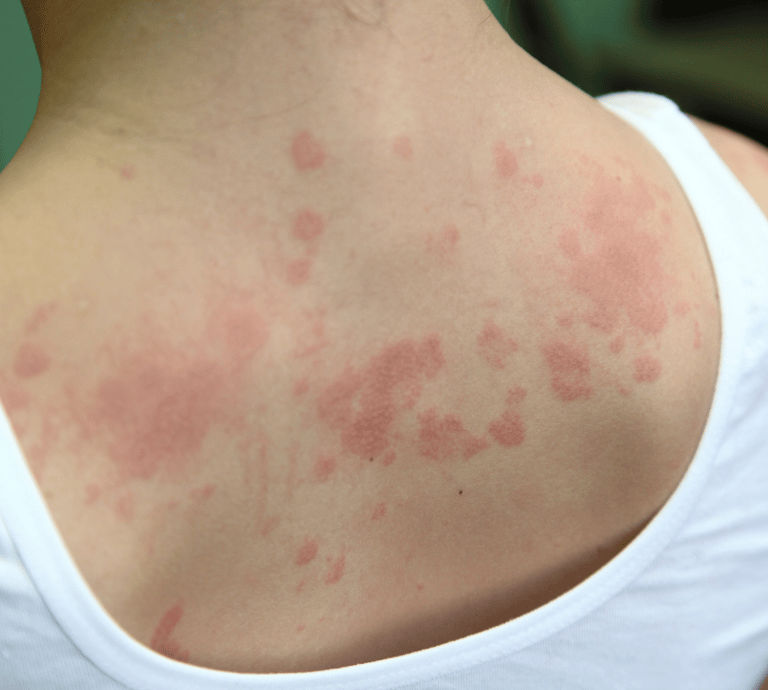Urticaria
Urticaria, commonly known as hives, is a skin condition characterized by raised, itchy welts that can vary in size and shape. These welts often appear suddenly and can be triggered by various factors, including allergens, stress, or certain medications.
While urticaria can be uncomfortable and distressing, understanding its causes, symptoms, and treatment options can help manage this condition effectively. We will explore the essential information about urticaria, empowering you to recognize and address it promptly.


Relief is Just a Welcoming Touch Away: Understanding Urticaria.
Identify the Triggers, Find Relief: Take Charge of Urticaria.
Symptoms and Diagnosis of Urticaria
Urticaria: What It Is
Urticaria, commonly known as hives, is a prevalent skin condition characterized by raised, itchy welts or wheals that can vary in color from skin-toned to red. These bumps may also cause sensations of burning or stinging. The primary cause of urticaria is the release of a protein called histamine. When histamine is released into the bloodstream, it causes tiny blood vessels (capillaries) to leak fluid, leading to swelling and the development of the rash.
Key Facts about Urticaria
Prevalence: Approximately one in five people will experience urticaria at some point in their lives, making it a common dermatological issue.
Symptoms: The main features of urticaria include:
Raised bumps or welts on the skin
Itching, which can be intense
Burning or stinging sensations
Triggers: Urticaria can be triggered by a variety of factors, including:
Allergens (foods, medications, insect stings)
Environmental factors (temperature changes, pressure, sunlight)
Stress
Underlying health conditions (autoimmune diseases, infections)
Duration: The welts can appear suddenly and may last for a few hours to several days. In some cases, urticaria can be chronic, persisting for six weeks or more.
Understanding urticaria is crucial for effective management and treatment. If symptoms persist or worsen, it is recommended to consult a healthcare professional for evaluation and guidance.
Signs & Symptoms of Urticaria
Urticaria (hives) is characterized by several distinct signs and symptoms:
Key Features:
Itchy or Burning Sensation: Individuals often experience intense itching or a burning feeling in the affected areas.
Appearance of Bumps:
Raised, swollen bumps can range in color from skin-toned to red.
Bumps may coalesce to form larger swollen areas.
The edges of these bumps are clearly defined, and they typically have a smooth, slightly raised surface.
Upon pressure, the center of the bumps will turn white (a phenomenon known as blanching).
Duration of Bumps:
Each individual bump may last from just a few minutes to several hours, often disappearing within a day.
After resolution, the skin usually appears completely normal, without any lingering marks.
Angioedema:
This condition involves swelling beneath the skin, which may affect areas such as the face, lips, or throat.
Urgent Care: If urticaria is accompanied by angioedema and symptoms like trouble swallowing or breathing occur, emergency medical attention should be sought immediately.
When to See a Physician:
Persistent Symptoms: If symptoms are severe or last more than two days.
Accompanied Symptoms: Seek medical help if other symptoms arise, such as:
Fever
Joint pain
Night sweats
Self-Resolving Urticaria: If the hives go away on their own and do not recur, medical consultation is usually not necessary.
Classification of Urticaria:
Acute Urticaria: Lasts six weeks or less and is the most common form.
Chronic Urticaria: In some cases, urticaria can persist longer than six weeks, lasting for months or even years.
Recognizing the signs and symptoms of urticaria is essential for effective management and appropriate treatment. If you have concerns about your symptoms, it’s best to consult with a healthcare professional.
Causes of Urticaria
Urticaria (hives) can arise from various triggers, which are classified into acute and chronic forms.
Diagnosis:
A doctor will diagnose urticaria by:
Symptom Inquiry: Asking about the symptoms experienced.
Medical History: Reviewing past health issues and exposures.
Physical Examination: Observing the rash and other signs.
Additional Tests:
In some cases, tests such as skin biopsies or blood tests may be conducted to rule out other medical conditions.
If an allergic cause is suspected, a skin prick test may be performed to identify specific triggers.
Acute Urticaria:
Acute urticaria can develop rapidly and is often linked to:
Infections: Common viral infections such as colds or flu.
Allergic Reactions: Reactions to allergens from foods, environmental factors, or medications. Common triggers include:
Foods:
Nuts
Eggs
Shellfish
Medications:
Antibiotics
Acetylsalicylic acid (ASA)
Ibuprofen
Environmental Factors:
Insect bites or stings
Latex
Pet dander
Pollen and certain plants
Contrast dye used in medical imaging
Chronic Urticaria:
Chronic urticaria lasts for more than six weeks and is often linked to:
Autoimmune Disorders: The immune system malfunctions and releases histamine due to various mechanisms. Chronic urticaria is frequently associated with other autoimmune diseases, including:
Thyroid disease
Rheumatoid arthritis
Lupus
Sjögren’s syndrome
Celiac disease
Type 1 diabetes
Demographics:
Prevalence: Chronic urticaria is more common in adults, especially women.
Development in Children: It is estimated that 20 to 30 percent of cases of acute urticaria in infants and young children may progress to chronic urticaria.
Understanding the causes of urticaria is essential for effective management and treatment. If you experience symptoms, consult a healthcare professional for appropriate evaluation and care.
Triggers of Urticaria
Urticaria (hives) can be triggered by a variety of factors, including emotional and physical stimuli.
Emotional Triggers:
Stress: Emotional stress is a significant trigger for urticaria. It can precipitate or worsen symptoms, leading to a distressing cycle where urticaria itself causes stress, further exacerbating the condition. Some individuals may notice hives forming exclusively during stressful situations. Therefore, managing stress levels can be beneficial in controlling urticaria symptoms.
Physical Triggers:
Certain physical conditions can also lead to a specific type of urticaria known as physical urticaria. These triggers include:
Temperature Changes:
Heat: Exposure to heat can cause hives in some individuals.
Cold: Cold temperatures can also trigger an outbreak of hives.
Light Exposure:
Some people may experience urticaria as a reaction to sunlight or artificial light.
Pressure:
Pressure applied to the skin (e.g., from tight clothing or carrying heavy bags) can lead to hives.
Vibration:
Activities that involve vibration, such as riding a bike or using power tools, can provoke hives.
Sweating:
Excessive sweating, often triggered by exercise, can also result in urticaria.
Understanding these triggers is essential for individuals with urticaria, as avoiding known triggers can help minimize flare-ups and improve overall quality of life. If you suspect that stress or physical factors are contributing to your urticaria, consider discussing management strategies with a healthcare professional.
Treatment of Urticaria
The treatment of urticaria (hives) varies based on the severity and underlying causes of the condition. Here's an overview of common treatment approaches:
General Management
Observation: In most acute cases, urticaria may resolve on its own, and no treatment is necessary.
Avoiding Triggers: If an allergic cause is identified, the first step is to avoid the trigger to prevent recurrence.
Symptomatic Relief
Cool Baths or Showers: Taking cool baths or showers can help soothe the skin and alleviate itching.
Loose Clothing: Wearing loose-fitting clothing may reduce irritation on the skin and provide comfort.
Avoid Scratching: It’s essential to refrain from scratching the affected areas to prevent further irritation and potential skin damage.
Medications
Antihistamines:
These are the primary treatment for urticaria and can be taken orally.
Non-Drowsy Options: Newer antihistamines that do not cause drowsiness are preferred (e.g., cetirizine, loratadine).
Dosage: Urticaria often requires larger doses, up to four times the standard dose. If over-the-counter options are ineffective, consult your physician for alternative antihistamines or dosage adjustments.
Corticosteroids:
Oral Corticosteroids: Medications like prednisone may be prescribed for severe symptoms that do not respond to antihistamines.
Short-Term Use: Corticosteroids are typically reserved for short-term use due to potential side effects.
Epinephrine:
Individuals with severe urticaria accompanied by angioedema should carry a self-injecting epinephrine pen (epinephrine autoinjector) for emergencies.
Biologics:
Omalizumab: This monoclonal antibody is effective for adolescents and adults with chronic urticaria that persists despite other treatments.
Immunosuppressive Agents:
In some severe cases, medications such as cyclosporine or hydroxychloroquine may be considered. These treatments will be discussed by your doctor based on clinical indications.
Seeking Medical Advice
If you experience severe symptoms, prolonged urticaria lasting more than a few days, or additional symptoms such as fever, joint pain, or night sweats, it’s crucial to consult your physician.
Patients with uncontrolled urticaria often experience a significant impact on their quality of life. There are many effective treatments available, so don't hesitate to discuss your options with a healthcare provider.
Take-Home Messages
Non-Contagious Condition: Urticaria (hives) is not contagious, meaning you cannot contract it from someone who is experiencing the condition.
Unknown Causes: In many cases (up to 50%), no specific cause for urticaria can be identified.
Effective Management: Despite the unknown origins in some cases, there are numerous treatments available that can effectively manage urticaria and provide significant symptom relief. Always consult a healthcare provider to explore the best treatment options for your situation.
Contact a Dermatologist






